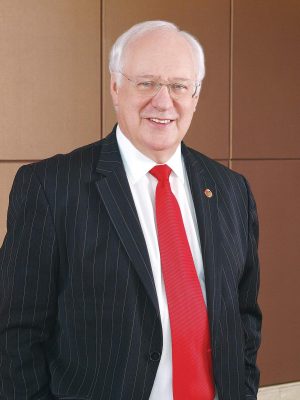
Hotelier whose management company was ‘born in China’ has a passion for New Zealand dairy farming
“I’m actually a country boy,” said Gavin Faull when asked about his formative years, before adding: “From a place called Taranaki in New Zealand.”
By his own admission, he has a very humble background.
“There were no Rolls-Royces where I was brought up,” said Faull.
“I grew up on a small farming village of 200 to 300 people and my parents ran a grocery store there. That’s where I started my MBA in business, as a 10-year-old working in a grocery store — how to make profits, how to relate to people, even how to market.”
Fast-forward to the present and you see a very different picture.
Faull is now chairman and president of Swiss-Belhotel International. He has led the Hong Kong-based property management group for the past 27 years. Under his leadership, it now oversees more than 145 hotels and resorts in 21 countries including Vietnam, Indonesia, the Philippines, Malaysia, Cambodia, Saudi Arabia, Australia and New Zealand.
“As a company we’ve always been adventurous, we’ve always been pioneering and that’s why we’re in so many places.”
He also owns and manages a 1,200-acre (485 hectare) dairy farm back in his hometown.
“I have Maori heritage, so I’m a real New Zealander,” said Faull.
“On one side I’m fifth or sixth generation, arriving in the 1840s, and on the other side arriving a few hundred years earlier by canoe.”
Faull is one of five brothers, each of whom has carved out their own unique niche.
“My eldest brother was a master at the largest government school in Auckland, another brother is a medical professor who was just knighted last year for his research into Parkinson’s disease and Alzheimer’s, another brother who’s an Anglican archdeacon (and) another brother who runs retirement homes in Australia.”
After graduating from Wellington, New Zealand’s capital, as an accounting major with a degree in commerce, Faull had a short stint working with professional services firm EY.
“I first went to Hong Kong in 1973, almost as a kid, to work for KPMG. I then got snapped up by the Peninsula Group (which runs Hong Kong’s iconic hotel) and the rest is history.”
Faull recounts how his company’s origin has a special bond with China.
“My company was born in China,” he said. Their first client was the Jianguo Hotel, Beijing — the first real international hotel in the Chinese mainland — which opened in 1983, said Faull.
“It was full from day one. In 1987, my boss from the Peninsula Group, Peter Gauci, left and set up Swiss-Belhotel and took over the management of the Jianguo Hotel. So that was our first hotel. We managed it for 10 years.
“We grew up in China mainly as a management consultant company. We set up hotels and got them going in places like Shekou and Guangzhou, and that was the philosophy of Swiss-Belhotel International. So we would set up all the systems and then pass them over to the owners.”
Faull returned to Australasia in 1983, where he took up the position of CEO at property management company Kingsgate International.
He came back to Hong Kong in 1990 for another bite of the cherry — and what sweet cherries they proved to be, with Swiss-Belhotel going from strength to strength.
When Faull bought the company in 2000 from his partner (Gauci) in Hong Kong, even though there were only three hotels on the books at that stage, he understood the importance of being a branded hotel company.
“I realized that branding is key, was key and still is key for the business.”
Faull believes that the secret to doing business in China is to understand and respect the culture.
“The (Chinese) economy is warming up — it hasn’t even got into full swing yet. I see a tremendous future. I am at the moment discussing with two or three groups a joint-venture approach to China, because everything must be a JV,” he said.
“Most people look at a JV from an investment point of view. I’m looking at it from a management point of view. I’m concluding a deal by mid-2018 and then I will start an aggressive expansion in China.”
The location and type of hotel for the expansion will depend on the particular partner.
“The more you learn about China, the less you know,” said Faull.
“What I have found in China is that there are three time periods (representative) of China’s development.”
One is the older age group, which came through the “cultural revolution (1966-76)”, he said. The next group, as Faull sees it, are people in the 45-60 age group.
“And now we have the new era — I don’t like using words like millennial — the 20- to 45-year-olds who have an international education. There is a huge number studying overseas, but you don’t need to be studying overseas to become a global person,” he said.
“Due to the internet, they have huge access to information. They are no longer talking in terms of bringing in expertise, because now they’re using expertise.”
Faull observed that the new generation is not necessarily looking for six-star accommodation like some of the older generations. It is looking for what he calls “fast accommodation”.
“Fast value, fast ideas, convenience. You don’t go to a hotel for special cuisine; you go to all the new restaurants around the city. The same thing has happened in the West — but what took the West 100 years has taken China 10 years.”
Despite working in what Faull called “one of the oldest professions”, he sees the business of hospitality undergoing significant change.
“Distribution, marketing and the whole access to hospitality has changed. A humongous change — with IT, with artificial intelligence, with how we’re getting to our hotels,” Faull said.
“I know robots are coming, but I don’t think we want to be served our breakfast by robots, otherwise we’ll end up feeling like battery chickens. But things will be faster. Kitchens will be run by robots and the back of the hotel will be run by robots.”
Faull also acknowledged the online booking of hotels is having a marked effect, likening its impact to Internet behemoths Airbnb, Uber and Amazon.
“This is the humongous change — not just of the (hospitality) industry, of the world.”
Not one to rest on his laurels, Faull is always on the lookout for new business opportunities. His latest venture — Zest — has identified a niche for the cost-conscious traveler.
As well as his hospitality interests, Faull also finds time to maintain a thriving dairy farm back in Taranaki in New Zealand’s North Island.
“I’m into dairy farming in a big way. I continue to develop that. Agriculture is my passion — handling effluent in an environmentally friendly way.”
Faull’s father and brothers originally ran it as a 100-acre farm but he has gradually expanded it over time.
“I’ve now developed it up to 1,100 to 1,200 acres and now have 1,300 cows. I have computerized milking sheds. Everything’s tagged — it’s run like a hotel. I follow the cow like I follow the guest,” he said.
“I’ve been lucky over the past five years with my three sons all coming home to work for me. I can share my knowledge and my passion. So it’s a family affair.”
And having just turned 70, the bona fide New Zealand rich-lister — who flies 80 hours a month — has no intention of taking it easy.
“No one can keep up with me. And if Murdoch can keep going and Trump can become president in his 70s, I can keep going for many decades,” he said, referring to media magnate Rupert Murdoch and US President Donald Trump.


